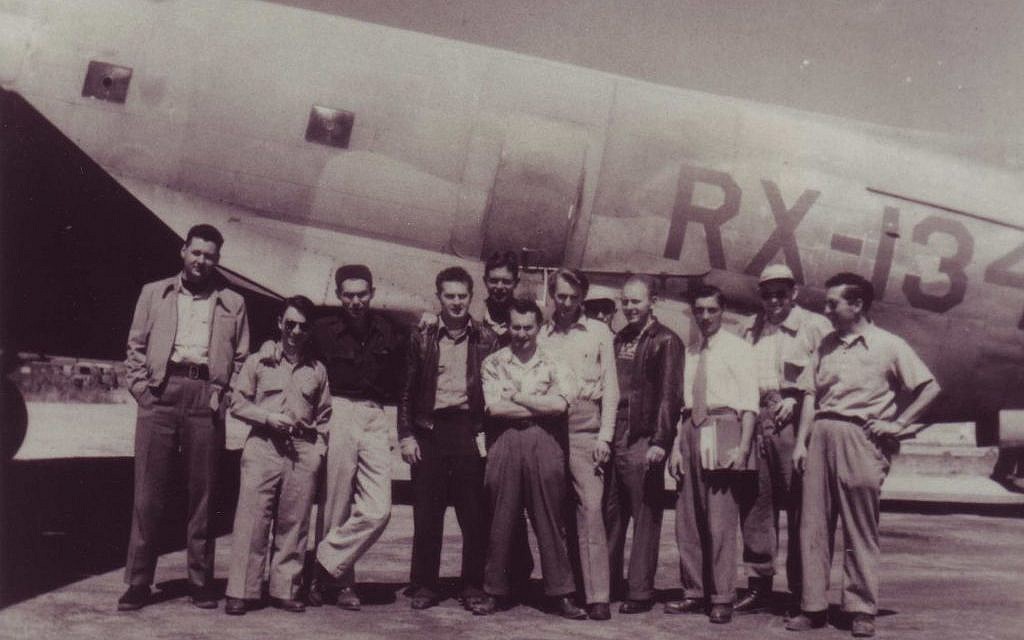Harold Livingston, an American aviator who helped found the Israeli Air Force and later worked as a Star Trek screenwriter, died on Thursday at the age of 97, his nephew told Variety magazine,
Born in 1924 and raised in Haverhill, Massachusetts, outside Boston, Livingston served as a radio operator in the US Army Air Force in World War II after color-blindness prevented him from becoming a pilot.
In early 1948, a friend of his worked at Trans World Airlines contacted him to see if he’d be interested in helping ferry weapons to the Jews in then-Mandatory Palestine.
“I got a letter from a friend of mine at TWA. And the letter simply said, ‘If you’re interested in flying munitions to Palestine, call this number in New York and ask for Swifty,'” Livingston recalled in “Above and Beyond,” a 2014 documentary about the American airmen who served in Israel’s War of Independence.
“So what the hell? I called the number,” he said. “I knew my whole life would be different. I just knew it.”
Swifty was the nickname of Irwin Schindler, an American Jewish pilot who owned a tiny airline, Service Airways, which he’d turned over to the pre-state Haganah militia to use as a front for its operations as various arms embargoes — by the United States, United Kingdom and other European nations — prevented the Jews in Mandatory Palestine from openly purchasing military equipment.
Livingston was one of the first people to join what would eventually become the Israeli Air Force.
Before he made his way to the Middle East, Livingston first helped recruit more aviators, scouring stolen military records for pilots with Jewish-sounding names.
Once Service Airways illicitly acquired transport aircraft and found enough aviators to fly them, Livingston and the others made their way in US military surplus Curtiss C-46 Commando airplanes from the US to Czechoslovakia, from which they would transport materiel to Mandatory Palestine.
Much of Israel’s War of Independence, Livingston served in what is known as the Air Transport Command, a semi-independent outfit that mostly brought critically needed aircraft, weapons and ammunition first to the Haganah and then to the Israel Defense Forces.
In some cases, however, Livingston and the command also conducted bombing raids with the C-46 transport planes by rolling bombs out of the doors — a track was later installed to make this somewhat safer and more precise — as the country at the time didn’t ‘t own bomber aircraft.

Al Schwimmer’s men in front of a C-46 plane with Panama markings. (Courtesy of Boaz Dvir via JTA)
Though Livingston was fiercely committed to helping the nascent State of Israel, he had no intention of staying in the country after the war and unequivocally considered himself to be an American.
In “Above and Beyond,” Livingston recalled having an argument with an Israeli girlfriend who wanted him to settle in Israel after the war.
“I said, ‘No, I’m a yankee, an American.’ I said, ‘I’m here to help you people.’ She said, ‘You can help us by helping us grow.’ I said, ‘I’m helping you become an entity, isn’t that enough?'” he said.
As a result of this view, in late 1948 when the Air Transport Command was meant to be integrated into the newly formed Israeli Air Force, Livingston led a near mutiny against the move. Livingston and a number of other airmen saw the dissolution of the command as both an act of ingratitude by the air force and as a potential threat to their American citizenship.
Though it is rarely enforced today, at the time Americans were legitimately at risk of having their citizenship stripped for serving in a foreign military, and indeed a number of the people involved in Service Airways were prosecuted by the US government, though none of them were stripped of their citizenship.
Livingston and the others threatened to go on strike if the move went through, though the American airmen eventually backed down, retracted their ultimatum and joined the Israeli Air Force.
A short time later, Livingston completed his commission and returned home to the US. He wrote his first book a few years later, “The Coasts of the Earth,” a novel about American aviators who volunteered to fly for Israel. He wrote two more novels before moving to television, writing for a number of shows in the 1960s and 1970s, including “Mission: Impossible” and “The Six Million Dollar Man.”
In 1979, he wrote the script for “Star Trek: The Motion Picture,” which was a box office hit but received somewhat middling reviews from critics for its slow pace. However, the film has since gained a cult following and earlier this month a 4K version of the movie’s director’s cut was released by Paramount Pictures.
Livingston revisited his time literally getting the Israeli Air Force off the ground in 1994, writing a 262-page book about his experience, “No Trophy, No Sword.”
Livingston is survived by his daughters, Leah Livingston Hopkins and Eve Livingston, his son, David Livingston, and his nephew, Robert Livingston.

